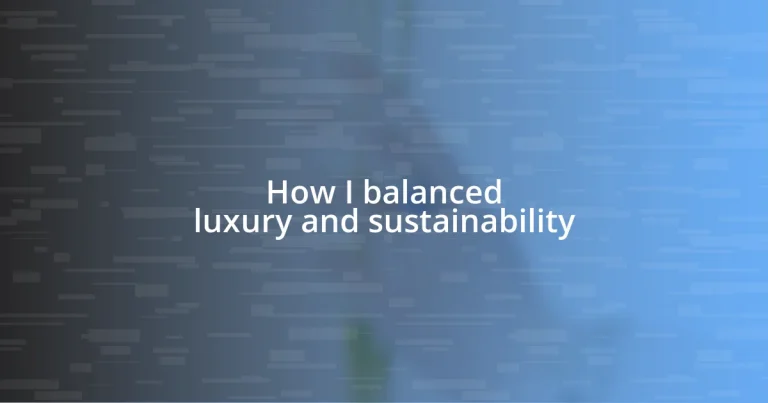Key takeaways:
- The perception of luxury can evolve to embrace sustainability, with ethical brands offering exquisite craftsmanship alongside eco-friendly practices.
- Ethical consumption supports local artisans, reduces environmental impact, promotes transparency, fosters mindfulness, and inspires market change.
- Investing in quality, choosing second-hand luxury, and prioritizing eco-friendly materials can harmonize luxury and sustainability in personal lifestyle choices.
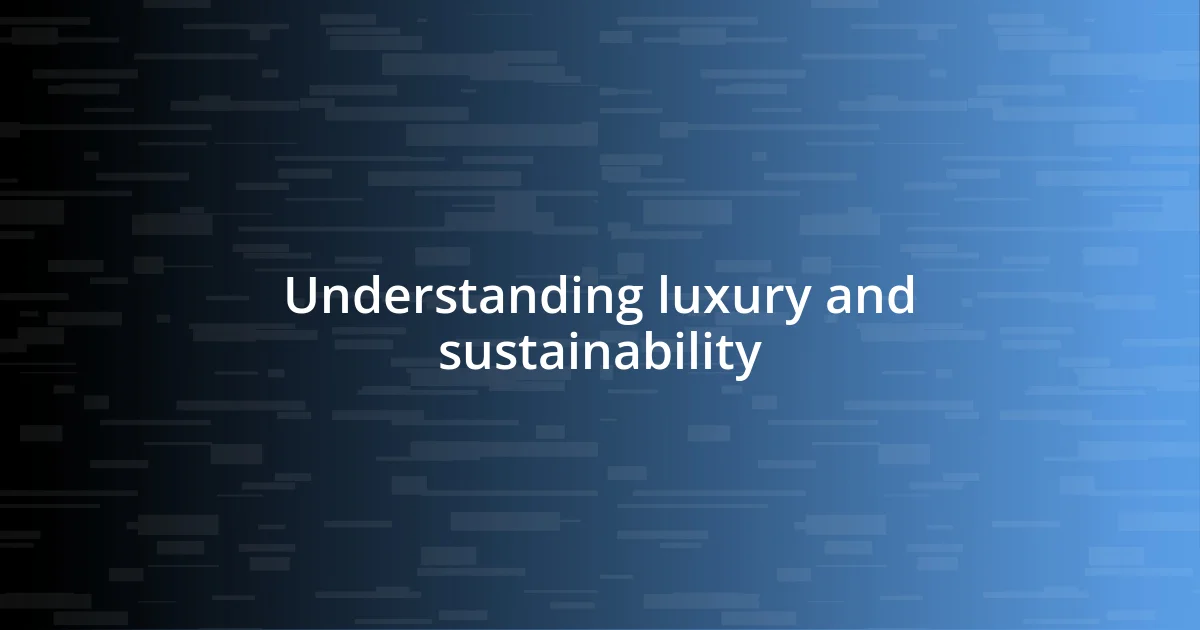
Understanding luxury and sustainability
Luxury and sustainability might seem like opposing forces at first glance. I used to think that indulging in high-end products meant sacrificing ethical values. However, my perspective shifted when I discovered brands that prioritize both exquisite craftsmanship and eco-friendly practices. Isn’t it fascinating how luxury can also mean supporting artisans and sustainable materials?
As I navigated through this realm, I found that luxury isn’t just about cost; it’s about quality, experience, and originality. Remember that time I splurged on a sustainably made handbag? It wasn’t just a purchase; it felt like an investment in my values and a connection to the artisans behind the creation. I realized that true luxury can enhance my life while also respecting the environment.
Exploring this balance has opened my eyes to a greater understanding of luxury’s evolving definition. I now view each purchase as a statement of my beliefs. How many of us consider the story behind a product before making a decision? For me, knowing that my choices can impact the planet and support ethical practices makes every splurge feel not just indulgent, but meaningful.
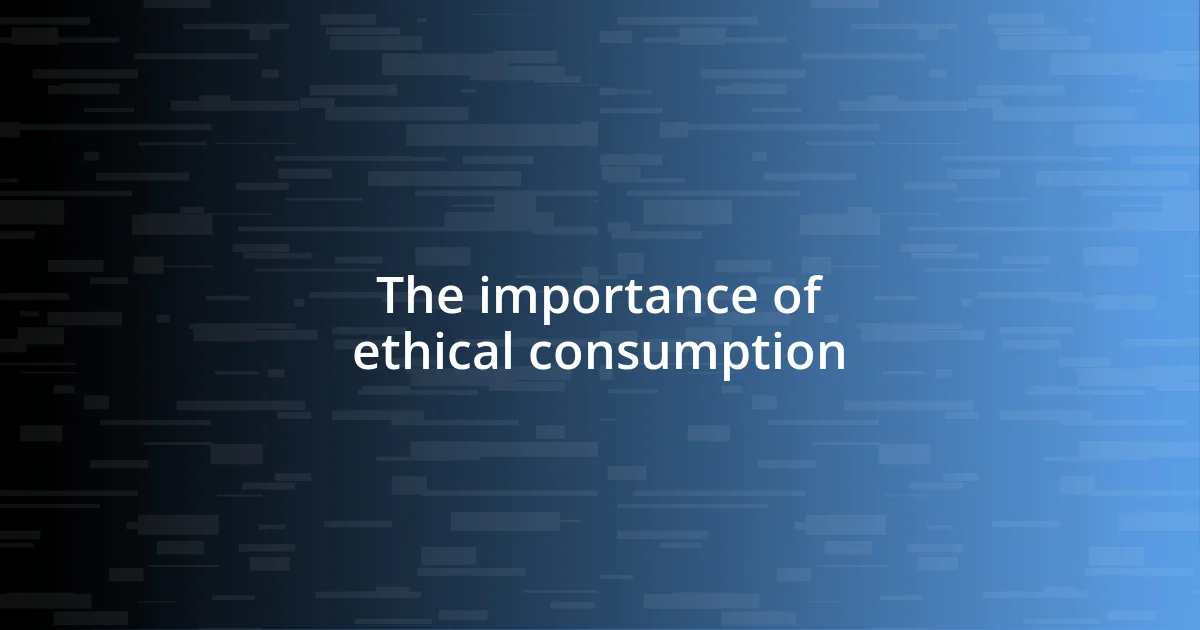
The importance of ethical consumption
Ethical consumption isn’t just a trend; it’s a powerful choice we make every day. I recall visiting a boutique that showcased handcrafted jewelry made from reclaimed materials. Each piece had a unique story, and it sparked my curiosity about the impact my spending could make. Rather than just buying a pretty item, I was investing in a vision—one that champions sustainable practices while supporting artisans and their communities.
Here’s why ethical consumption matters:
- Empowers Communities: Buying from ethical brands helps support local artisans and fair labor practices.
- Reduces Environmental Impact: Sustainable products often use eco-friendly materials and processes, reducing waste.
- Promotes Transparency: Ethical brands are more likely to share their sourcing and production processes, holding themselves accountable.
- Fosters Mindfulness: Knowing the story behind what we buy encourages us to make more conscious choices.
- Inspires Change: When consumers prioritize ethics, they push the market towards more sustainable and ethical practices.
Each time I make a purchase with intention, it feels like I’m part of a larger movement, one that prioritizes people and the planet alongside personal taste. It’s empowering to realize that my choices can drive positive change in the industry.
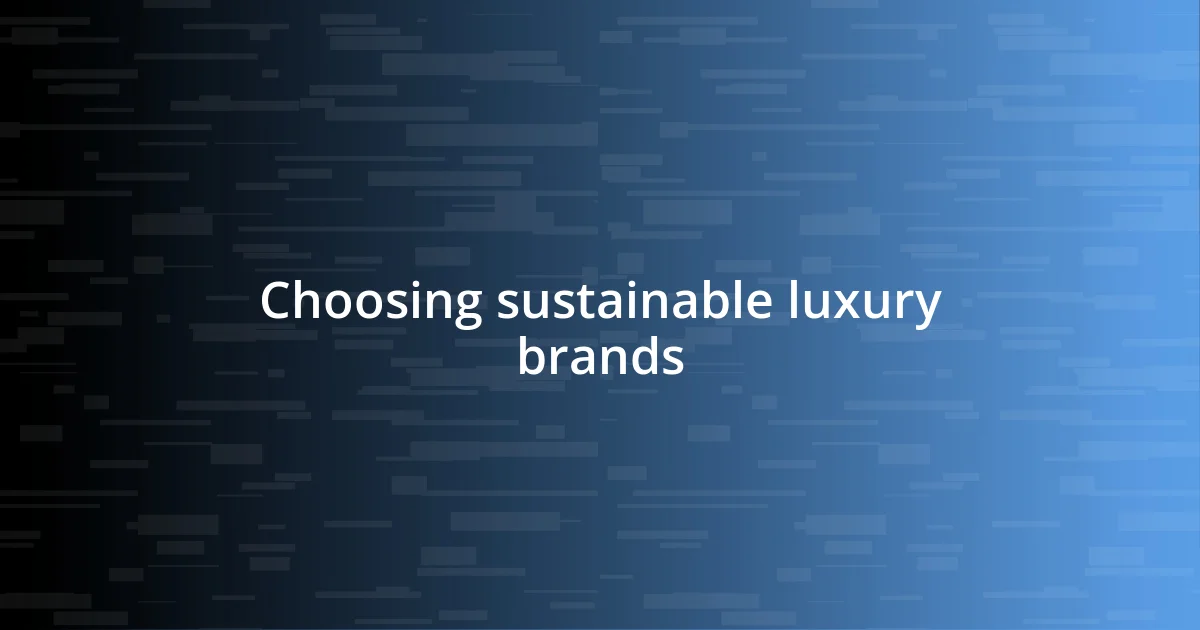
Choosing sustainable luxury brands
Choosing sustainable luxury brands is a journey that combines discernment with heart. I’ve sifted through countless options, often wandering through showrooms that glimmer with high-end allure. What strikes me most is often the story behind the labels—brands that are willing to share their sustainable practices resonate deeply with me. I remember the first time I discovered a luxury brand that sourced organic cotton and employed fair-trade labor. It felt incredible to know my purchase supported real social change while also satisfying my craving for beautiful design.
When considering sustainable luxury brands, I actively look for transparency in their production processes. For instance, I once came across a designer who openly detailed their sourcing of materials, and I felt an instant connection. It was more than just buying a piece of clothing; it transformed into an experience where I appreciated the journey it took to reach me. This focus on authenticity in brands not only enhances the emotional value of the purchase but also aligns beautifully with my values as a conscious consumer.
I wholeheartedly believe that the luxury market is shifting towards sustainability. There’s a growing community of brands that understand this change and cater to consumers like me, prioritizing the environment without compromising on style. As I make my choices, knowing that I’m supporting responsible practices fuels my passion for both luxury and sustainability, making every purchase feel like a step towards a more conscious lifestyle.
| Brand | Key Sustainable Practices |
|---|---|
| Stella McCartney | Uses innovative materials, cruelty-free, and actively campaigns for eco-friendly practices. |
| Patagonia | Focuses on recycled materials and encourages reuse and repair of garments. |
| Gucci | Commits to reducing its environmental impact with transparent supply chains and sustainable materials. |
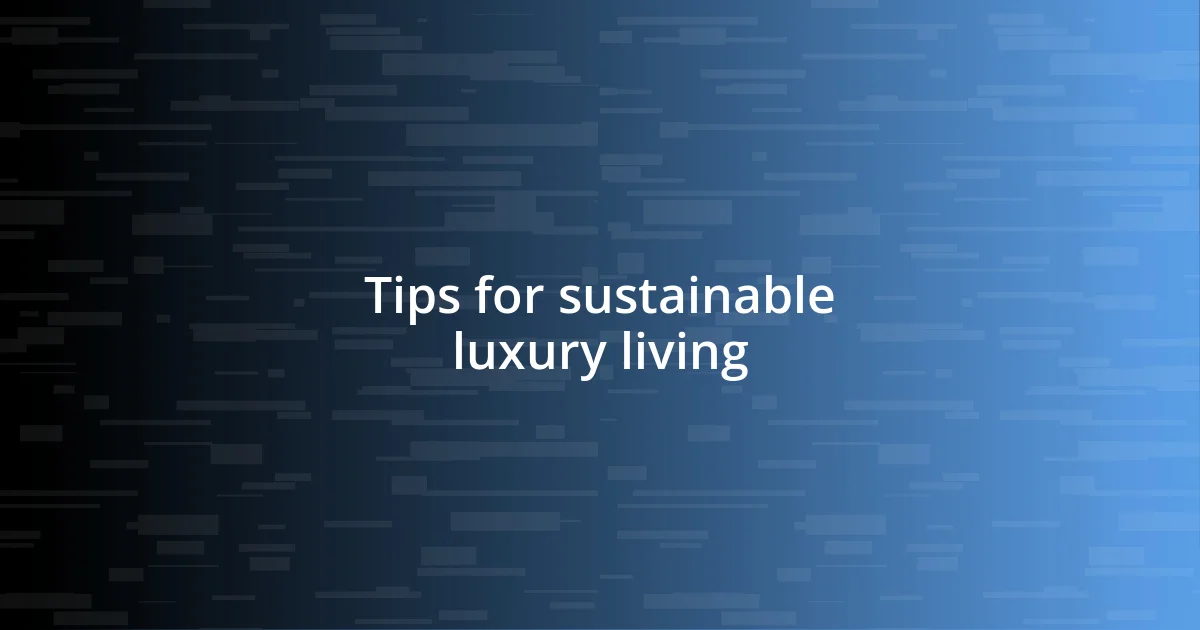
Tips for sustainable luxury living
One simple yet impactful tip for sustainable luxury living is to prioritize quality over quantity. I once found myself fascinated by a pair of shoes that were slightly more expensive than my regular picks but were crafted to last a lifetime. This led me to ponder: why clutter my closet with multiple average pairs when I could invest in one exquisite piece that tells its own story? This mindset not only elevates my style but also reduces waste in the long run.
Embrace second-hand luxury as a conscious choice. I vividly recall stumbling across a vintage designer handbag at a resale shop. It was in pristine condition, yet it held a charm that new items seemed to lack. How many people overlook such hidden gems? By choosing pre-loved items, we not only save money but contribute to a circular economy that keeps quality goods in circulation and out of landfills.
Lastly, consider your travel habits when curating a sustainable lifestyle. I’ve often opted for eco-conscious hotels that emphasize sustainability in their design and operations. I remember checking into a resort that boasted solar panels and local organic cuisine. The experience was enriching, feeling like I was connecting with the environment rather than exploiting it. Doesn’t it feel incredible to indulge in luxury while also supporting responsible tourism? Every mindful choice makes a difference, proving that luxury and sustainability can beautifully coexist.
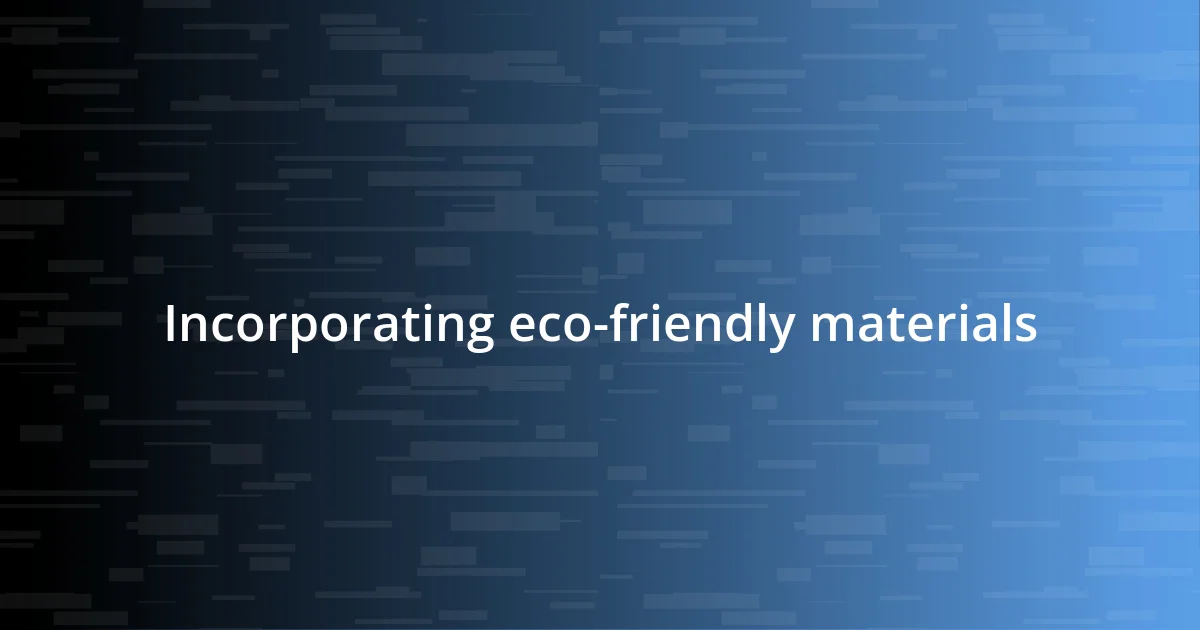
Incorporating eco-friendly materials
Incorporating eco-friendly materials into my luxury purchases has become a delightful exploration of my values. I still recall the excitement of unboxing a handbag made from vegan leather that not only looked stunning but also felt luxurious. It made me wonder: can beauty and ethics truly coexist? The answer, I found, lies in the artistry of brands that thoughtfully select sustainable materials without compromising on elegance.
I’ve also delved into the world of organic textiles, which have become a staple in my wardrobe. A few months back, I invested in a linen shirt that was not only soft and breathable but also sourced from manufacturers committed to reducing water usage. Wearing it brings me joy, reminding me that my fashion choices can reflect my commitment to sustainability. It’s amazing how such decisions can ignite a sense of purpose in the way I dress.
An experience that truly resonates with me is discovering brands that utilize recycled materials. I stumbled upon a chic pair of sneakers crafted from upcycled ocean plastics. When I wear them, I carry with me a piece of a greater narrative—a small reminder that fashion can lead to environmental restoration. Isn’t it empowering to think that even our style choices can contribute to a more sustainable future? This is how I embrace eco-conscious luxury; it’s about weaving sustainability into the very fabric of my life.
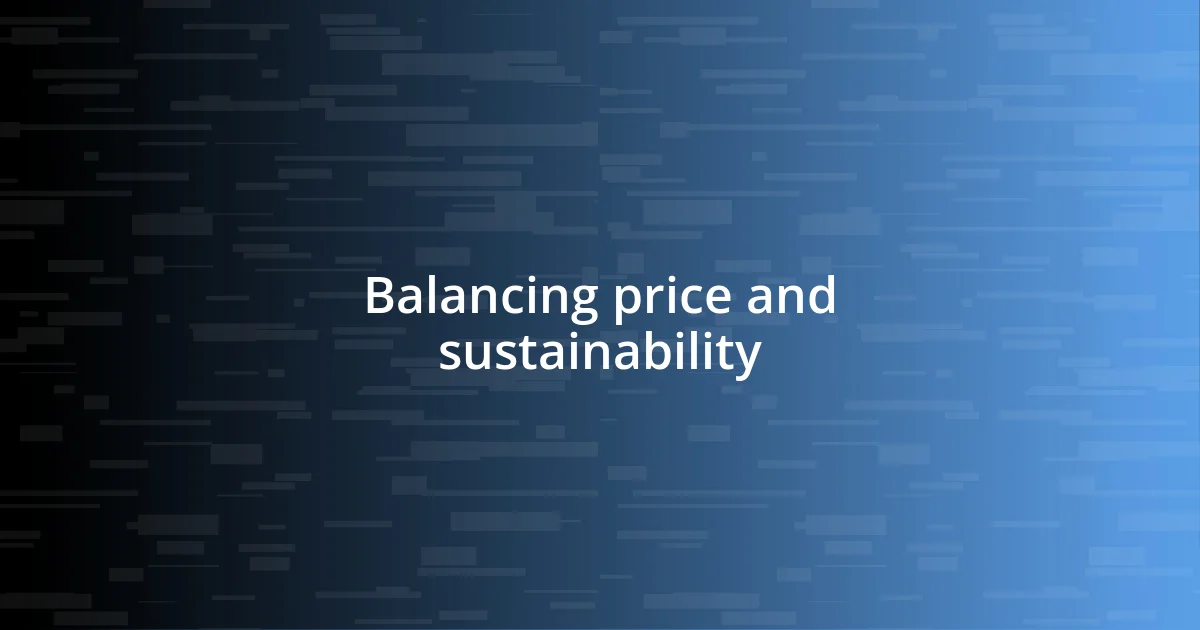
Balancing price and sustainability
Finding the right balance between price and sustainability is truly a personal journey. I recall the time I had my eye on a stunning sustainable watch. At first, the price tag made me hesitate. But then I thought about the craftsmanship and the eco-friendly materials used in its creation. Investing in something that not only looks great but is also responsibly made felt like a step toward aligning my values with my spending habits. Isn’t it satisfying to know that every dollar spent can drive positive change?
I’ve found that it helps to redefine what “luxury” means. Instead of associating it with the most expensive brands, I’ve started to see luxury as investing in timeless pieces that reduce waste. Just the other day, I chose to buy a beautifully crafted wooden serving board made by a local artisan instead of a mass-produced, plastic version. The price was higher, but the story behind the piece and its eco-friendly materials filled me with so much joy. Can’t we all find fulfillment in supporting artisans who prioritize sustainability?
Moreover, I embrace the idea of spending a little more upfront for greater long-term savings and benefits. Reflecting on my experience with a subscription to a sustainable clothing brand, it hit me how spending that extra dollar per piece meant I received high-quality items designed to last. It’s comforting to know that by prioritizing sustainability, I’m ultimately saving money and reducing my environmental footprint. How liberating is it to realize that luxury doesn’t have to come at the expense of our planet?












